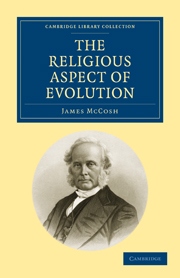Book contents
- Frontmatter
- PREFATORY NOTE TO SECOND EDITION
- PREFACE
- Contents
- CHAPTER I THE STATE OF THE QUESTION
- CHAPTER II THE ORGANIC HISTORY
- CHAPTER III POWERS MODIFYING EVOLUTION
- CHAPTER IV BENEFICENCE IN THE METHOD OF EVOLUTION
- CHAPTER V FINAL CAUSE IN EVOLUTION
- CHAPTER VI GEOLOGY AND SCRIPTURE
- CHAPTER VII THE AGE OF MAN
CHAPTER I - THE STATE OF THE QUESTION
Published online by Cambridge University Press: 05 March 2012
- Frontmatter
- PREFATORY NOTE TO SECOND EDITION
- PREFACE
- Contents
- CHAPTER I THE STATE OF THE QUESTION
- CHAPTER II THE ORGANIC HISTORY
- CHAPTER III POWERS MODIFYING EVOLUTION
- CHAPTER IV BENEFICENCE IN THE METHOD OF EVOLUTION
- CHAPTER V FINAL CAUSE IN EVOLUTION
- CHAPTER VI GEOLOGY AND SCRIPTURE
- CHAPTER VII THE AGE OF MAN
Summary
Evolution and Causation.—Evolution, the drawing of one thing out of another, is deep in nature. It proceeds from causation, which is universal. In the world things are so connected that every one thing proceeds from some other, and all things from God. This arises from the universal action of causation. A cause (in physical nature) develops into an effect, and an effect is an evolution from a cause. The All-Mighty God, in all his works, might have acted immediately—that is, without any creature instrumentality. He might have produced crops and cattle, heaved up mountains and lowered plains, determined birth and death without the use of means of any kind. But in this case I do not see how mankind, with their present faculties, could have anticipated any of these occurrences, as it is only by the preparations for them that we know that they are coming. God has been pleased to arrange instead that every physical event has a physical cause,—the only exception being the miracles of the Old and New Testaments, which serve their purpose because they are exceptions. Causation is universal in physical nature, and causation develops all we see, or, to express it otherwise, all that we see is evolved from causes. We shall see that the evolution of plants and animals is produced by organized causes.
- Type
- Chapter
- Information
- The Religious Aspect of Evolution , pp. 1 - 27Publisher: Cambridge University PressPrint publication year: 2009First published in: 1890



